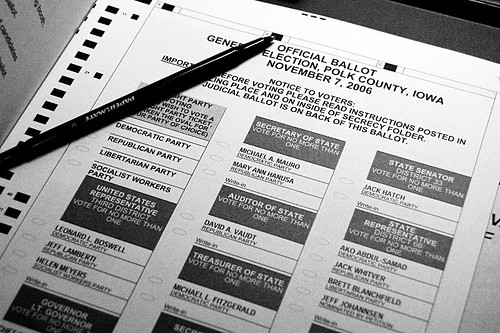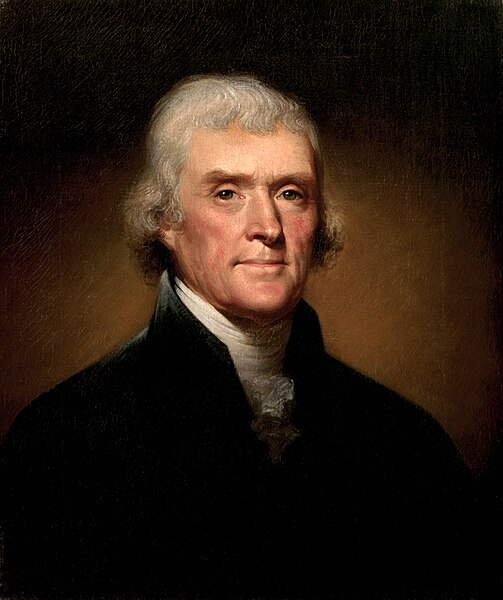Do Christian candidates
necessarily make good presidents? Ostensibly, we have never had a
non-Christian president. In the election of 2000, Al Gore said he
decides important questions by asking himself “What would Jesus
do?” George W. Bush declared that his favorite philosopher is
“Christ, because he changed my heart” (Dionne, 173).
During the election of 1800, Jefferson was accused of infidelity for saying, “It does me no injury for my neighbor to say there are twenty gods or no God. It neither picks my pocket nor breaks my leg.” However, Jefferson said, “God, who gave us life, gave us liberty. Can the liberties of a nation be sure when we have removed their only firm basis, a conviction in the minds of the people, that these liberties are a gift from God?” John Adams signed the Treaty of Tripoli declaring “The Government of the United States of America is not…founded on the Christian religion.” But, John Adams said, “Our Constitution was made only for a moral and religious people. It is wholly inadequate to the government of any other.” The verdict of Jefferson and Adams is clear: our government is not religious; only people can be religious. Federalists warned Christians that they would have to hide their Bibles if Jefferson were elected (Ferling, 154), but Jefferson stood for “limited [government] powers, no eternal wars, free commerce, and liberty” (Ferling, 127). Jefferson was elected and Americans enjoyed greater liberties, not persecution; many Democratic-Republicans were released from prison with the repeal of the Alien and Sedition Act (Ferling, 110). Roger Williams said, “Christ Jesus never called for the Sword of Steel to help the Sword of the Spirit,” and he believed that non-believers could manage the affairs of state as well as believers (Lambert, 89).
During the election of 1800, Jefferson was accused of infidelity for saying, “It does me no injury for my neighbor to say there are twenty gods or no God. It neither picks my pocket nor breaks my leg.” However, Jefferson said, “God, who gave us life, gave us liberty. Can the liberties of a nation be sure when we have removed their only firm basis, a conviction in the minds of the people, that these liberties are a gift from God?” John Adams signed the Treaty of Tripoli declaring “The Government of the United States of America is not…founded on the Christian religion.” But, John Adams said, “Our Constitution was made only for a moral and religious people. It is wholly inadequate to the government of any other.” The verdict of Jefferson and Adams is clear: our government is not religious; only people can be religious. Federalists warned Christians that they would have to hide their Bibles if Jefferson were elected (Ferling, 154), but Jefferson stood for “limited [government] powers, no eternal wars, free commerce, and liberty” (Ferling, 127). Jefferson was elected and Americans enjoyed greater liberties, not persecution; many Democratic-Republicans were released from prison with the repeal of the Alien and Sedition Act (Ferling, 110). Roger Williams said, “Christ Jesus never called for the Sword of Steel to help the Sword of the Spirit,” and he believed that non-believers could manage the affairs of state as well as believers (Lambert, 89).
John Adams and Thomas Jefferson
Though Christ never called
on the sword of steel to help the Sword of the Spirit, the devil has
often called on the sword of religion to aid the sword of steel.
Machiavelli wrote, “Never was there a promulgator of extraordinary
laws in a nation who did not invoke God’s authority.” The twenty
fourth point of the Nazi’s “unalterable party program”
proclaimed that they stood for positive Christianity. In what Hitler
called a “state of order, freedom, and law,” soldiers wore “God
with us” on their belt buckles, and true religion was suppressed
under a façade of religion. The Nazis did not practice what they
preached.
Many political aspirants have good intentions. Daniel Webster said, “The
Constitution was made to guard the people against the dangers of good
intentions. There are men in all ages who mean to govern well, but they
mean to govern.
They promise to be good masters, but they
mean to be masters.”
These well intentioned politicians claim to worship God, while
advocating an adulterous marriage of Church and State and declaring
that “The State is god.” Claiming to separate Church and State,
they kick God out of government. Actually, they marry the Church
(people) to a new god, State. The Bible says, “God will supply
your every need” (King
James Version, Php.
4.19). They promise, “The government will supply your every need.”
God says, “I am the God that healeth thee” (King
James Version,
Exod. 15.26). These politicians promise, “The government will
supply your health care.” God says, “I have cared for you since
you were born. Yes, I carried you before you were born. I will be
your God throughout your lifetime--until your hair is white with age.
I made you, and I will care for you.” (New
Living Translation,
Isa. 46.3-4). They promise, “The government will care for you from
cradle to grave.” When we say the government should not take on
God’s responsibilities, we do not say that government has no
responsibilities; government must implement justice. We must
understand that “to tamper with man’s freedom is not only to
injure him, to degrade him, it is to change his nature, to render
him, in so far as such oppression is exercised, incapable of
improvement; it is to strip him of his resemblance to the Creator, to
stifle within him the noble breath of life with which he was endowed
at his creation” (Bastiat, 534).
 |
| via Flickr |
We must elect candidates devoted to defending religious liberty. Benjamin Franklin explained, “Only a virtuous people are capable of freedom. As nations become corrupt and vicious, they have more need of masters.” Tocqueville said, “[Champions of freedom] should hasten to invoke the aid of religion…without morality, freedom cannot reign, and without faith, there is no basis for morality” (Tocqueville, 12); he also observed, “Only God can be all powerful without danger, because his wisdom and justice are always equal to his power” (Tocqueville, 290). We must preserve economic freedom if we would preserve religious freedom; as Von Mises says, “In a system where there is no [free] market, where the government directs everything, all those other freedoms are illusory, even if they are made into laws and written in Constitutions” (Von Mises, 18). In Revelations, we see that an economic sanction forbidding buying or selling without the mark of the beast greatly injured religious liberty. We would do well to follow Patrick Henry’s advice to “guard with jealous attention the public liberty. Suspect everyone who approaches this jewel.”
My vote last election was not cast because Barack Obama belongs to the United Church of
Christ, Romney is a Mormon, Paul is a Baptist, or Santorum and
Gingrich are Catholics. I voted for the candidate whom i believe stood
firmly for liberty. John Winthrop wrote, “There is a civil and
moral liberty…which it is the mission of power itself to protect:
this is the liberty to do that which is just and good without fear.
This sacred liberty we must defend in all circumstances and, if
necessary, risk our life for it.” Winthrop was willing to risk his
life to defend liberty; we can, at least, give our votes for liberty.
Let’s be trustworthy voters; let’s choose candidates whose lives are sermons*. Let’s choose candidates who practice what they
preach.
Works
Cited
Bastiat,
Frederic.
Dionne,
E. J. Jr. et.al., eds.
One
Electorate under God: a dialogue on religion and American politics.
Washington, D.C.: Brookings Institution Press, c2004. Print.
Adams
vs. Jefferson: The Tumultuous Election of 1800.
New York: Oxford University Press, 2004. Print.
New York: Oxford University Press, 2004. Print.
The
Founding Fathers and the Place of Religion in America.
Princeton,
N.J.: Princeton University Press, c2003. Print.
The
Holy Bible: Authorized King James Version.
Nashville, Tennessee: Holman Bible Publishers, 1998. Print.
Nashville, Tennessee: Holman Bible Publishers, 1998. Print.
The
Holy Bible: New Living Translation.
Carol Stream, IL: Tyndale House Publishers, Inc., 2007. Print.
Carol Stream, IL: Tyndale House Publishers, Inc., 2007. Print.
Tocqueville,
Alexis de.
Democracy
in America. Trans.
Goldhammer, Arthur. New York: Library of America, 2004. Print.
U.S.
Constitution.
First Amendment.
Von
Mises, Ludwig.
Economic
Policy, Thoughts for Today and Tomorrow.
South Bend, IN: Regnery/Gateway, c1979. Print.


,_2nd_president_of_the_United_States,_by_Asher_B._Durand_(1767-1845)-crop.jpg/477px-US_Navy_031029-N-6236G-001_A_painting_of_President_John_Adams_(1735-1826),_2nd_president_of_the_United_States,_by_Asher_B._Durand_(1767-1845)-crop.jpg)

No comments:
Post a Comment